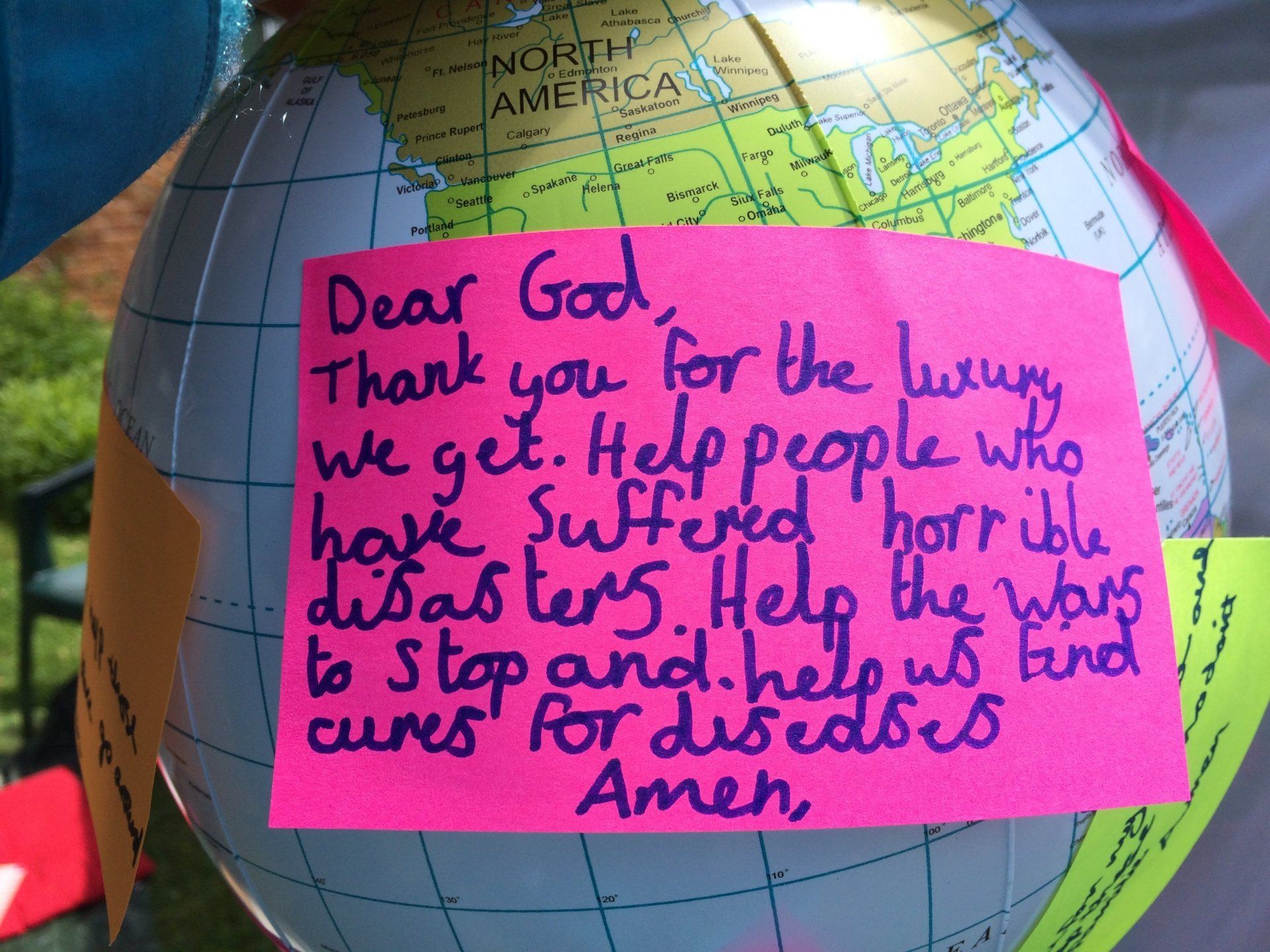Out of the mouths of babes

The market town of Olney in North Buckinghamshire – where my children go to school and I preach and worship – may not be well known but it has a number of historical quirks that make it worthy of interest; the town was home to the eccentric poet William Cowper, who lived on the market square together with his pet hares (his house is now a museum), and the abolitionist John Newton who together with Cowper wrote a collection of hymns including the world famous Amazing Grace - plus on Shrove Tuesday local ladies race through the town flipping pancakes, keeping alive a tradition that goes back to 1445.
On various occasions news crews and tourists have descended on Olney, and once a year around 1,000 school children are bussed into the town to take part in Lifepath – a programme run by Scripture Union, the various Olney churches, Bridgebuilder Trust (MK), Impact (Bedford), supported by the town council.
A few weeks ago, I decided to go along as an observer, to see what exactly Lifepath involved. It wasn’t hard to find; I simply followed the coaches, winding their way incongruously through the narrow lines behind the market place towards Glebe Field, a stone walled grass enclosure beside the beautiful thirteenth century parish church of St Peter’s and St Pauls.
Gaggles of excited eleven year olds gather to watch a dramatic re-enactment of Newton’s early life as a sea captain and slave trader. ‘I can hear noise down below,’ a ‘cabin boy’ tells a bewigged John Newton, played by the rector’s husband.
‘Don’t worry that’s just cargo,’ he replies.
‘But I can hear crying!’
‘There’s 250 of them down there. I give them three good meals a day, ‘says Newton holding up a giant cardboard box with ‘rice cakes filled with maggots’ written in marker pen.
As a storm brews off the coast off Sierra Leone, Newton tells the audience, ’‘If you are not praying, you had better start.’
The children are then led off to various workshops by local volunteers in eighteenth century dress. The field is soon filled with sound as children practice hand bell ringing and drumming as the bells of St Peter’s and Paul’s ring out from the spire above. In one corner, a group of children gather around the casually dressed rector who asks, ‘Have you ever met a vicar before?’
They shake their heads and shuffle their on their bottoms with embarrassment. ‘Okay, what do you think vicars look like?’ she asks.
One boy ventures, ‘They wear robes.'
Another pipes up, ‘And they wear a long scarf with crosses on.’
‘Vestments,’ another clarifies.
‘Where did you learn that word? the rector enquires. He doesn’t know, but an experience of some kind has wormed its way into his memory.
The rector then passes around her ‘long scarf’ which the children handle like a snake, reading out the embroidered names of God embroidered as they pass it on. Eli, Holy Ghost, Saviour, Christ, the Word, the Holy one, Creator of Heaven and Earth, King of Kings, son of man, Prince of peace, the great I am - the names tumble over each other like a monastic chant. The children are spellbound.
Outside the front of the church, local charity Olney-Newton Link (which raises funds to the community of Newton in Sierra Leone, named after the former slave trader) have set up a mock-up of an African village with a small hut made of rushes and a log fire for cooking.
One of the local charity organisers – whose daughter now lives in Sierra Leona – talks about a day in the life of a child in the West African country. ‘You put rice in here’ she explains, holding up a small pot ‘and if you are lucky’ chicken,’ she says adding a squeaky rubber chicken to the pot. Another volunteer passes around a bottle of cloudy rice water which she explains the children would drink before walking at least a mile or two to school, ‘It contains valuable carbohydrates.’ The children are wide eyed.
Inside the thirteenth century Anglican Church, a Baptist elder explains how Newton’s father, a ship’s captain brought him on board ship to get him away from bad company at home only for this to hasten his moral decline. ‘At one point there was a party and he got so drunk he fell overboard,’ he tells the giggling kids.
‘But as a grown up when he was caught in the storm off the coast of Africa, he lashed himself to the wheel and began praying “Save us” . . . He later wrote in his diary that he had met God in that storm and that he would turn his life around and serve Him.’
At the back of the church, ‘Newton’ tells the children how he and William Cowper would ride round the local villages with a Bible, providing a basic education, and how after prayer meetings, they would compose hymns to help the parishioners remember Jesus’s teachings.
Newton says, ‘It seemed odd that anyone would want to save anyone as horrible as me. Then I realised that God saved me for a reason. My one wish became that the slavery trade would be abolished. I wrote a hymn about it. Does anyone know its name?’ Every hand shot up.
Outside in the churchyard, the guide asks if anyone has been a church like this before.
‘I went to a funeral,’ grinned one small boy running his hands over the moss on the ancient gravestones.
In the United Reform Church, the children race with pancakes. At the Baptist church, they receive a lesson on 18th century history. ‘Does anyone know who this?’ asks the leader holding up a picture of Napoleon. ‘Donald Trump’ pipes up an eleven year old confidentially.
In the Cowper and Newton museum, the children lie down inside of a 183cm long rectangle painted on the floor. ‘Imagine that you have to lie there for two months with rats scampering over you and imagine what happens if you need a wee. Where will you go?’
‘In your pants,’ giggles one girl, but she stops laughing when told that 20% of the slaves were children under the age of fifteen.
In Cowper’s beautiful garden, children drop multi-coloured smarties into water as a leader explains that we are all the same on the inside and that God loves us all equally. ’So God loves me even when I do things wrong?’ asks an eight year old.
‘Yes, he may not like it when you do something wrong, but he never stops loving you.’
She turns the thought over in her mind.
Other children study blow up globes and are asked to think about places in the world that are hurting and invited to write a prayer but only if they want to. The globes are soon covered with poignant post it notes.
Dear God. Thank you for the good people in the world and that we live in wif me familie (sic).
Thank you for our homes. Please help people who don’t have homes help them not to be afraid.
Thank you for my bed and my pillow to have a warm night.
Let all the poor people in places like Syria make peace. Amen.
Plees help peopol stop cancer (sic).
Pleaes help other peole that ligh down at night that are codl and hungry. Thank you for my house and my safe roof and my bed (sic).
Please help consult stop and terrorist attacks around the world. Armen. (sic)
As the day draws to a close the children hear how Newton learnt of the success of the abolition of slavery bill just before his death. With a great roar they release a cloud of balloons into the azure sky.
‘Do you ever look at your lives and think about the things you would like to change? Do you ever think about your life path and wonder how it could be different? Have you ever thought about what faith means to you?’ the leader asks.
Pointing to piles of stones on the stage he explains how sometimes when you are walking in the hills in winter it can be hard to see but if you are lucky you will come across a cairn – a pile of stones which shows you that you are on the right path and not lost, which reassures you that others have been this way before. ‘I invite adults and children to pick up a stone and think about this day and what you will remember, whether it is that John Newton wore powdered wigs, or perhaps that you want to walk the path that he walked - to walk on Jesus’s path.’
A hush falls over the whole field and one by one the children come forward and placed their stones one upon another. The atmosphere on that field is electric. Something profound has happened this day.
